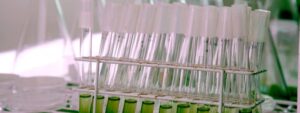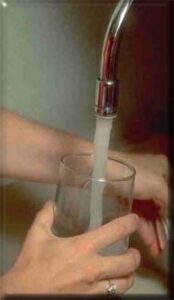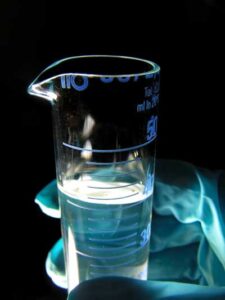Water Testing
Private well owners should maintain and test their own household water supply regularly. While the Water Resources Center does not conduct private testing, the Department of Health provides well owners with information about how to ensure their water is safe to drink.
This map and table show accredited laboratories in Minnesota that accept samples from private well owners and are certified to test for arsenic, coliform bacteria, lead, manganese, and/or nitrate. MDH reviews and updates this map each year.
Well Management Program
A well that is properly located, constructed, maintained, and tested can provide a reliable and safe drinking water source and serve many domestic, agricultural, and commercial purposes.
Ensures proper well location.
Correct distance from contamination sources (see image below).
Good drainage away from the well.
Highest practical site on the property.
Disinfects your well to get rid of harmful bacteria.
Collects an initial water sample after construction is finished to test for coliform bacteria, nitrate, and arsenic before you start using your well water for drinking or cooking.
Gives you a copy of the water test results and the Well and Boring Construction Record.

Where to test your water
Everyone should have their water tested for bacteria, nitrate, and lead when they move to a house with a private well, and at least every few years after that. Although other contaminants have the potential to contaminate your ground water as well, bacteria, nitrate, and lead are the most common and can be tested for a reasonable cost. Testing for those three ranges from a few dollars up to $30 or so (each parameter) in some labs, while testing for pesticides is likely to cost more.
If you are on a public water system (“city water”), the water system is required to test the water regularly. In general, you should not need to test the water yourself. If you live in an older home and suspect lead from your house’s piping may be contaminating the water, or have other reasons to suspect contamination, consider testing
The cost is $10 for bacteria, fluoride, or nitrate, and $20 for the lead, copper, and arsenic test, plus $6.50 shipping and handling.
Bacteria – To determine if the water is bacteriologically safe for drinking purposes.
Fluoride/sodium: Sodium is important for those on low sodium diets, fluoride is important in the prevention of dental caries
Total Nitrate-Nitrite: Nitrate is particularly a concern for infant feeding because infants are sensitive to nitrate. It is often used as a first test, particularly in agricultural areas, to see if any contamination is present.
Metals: Lead, copper and arsenic testing, which is a good idea in any home that may contain lead pipes. (The metals test is $20 + shipping)

Water Quality Testing
Although most areas in North America enjoy large amounts of high quality drinking water available at the push of a button, our drinking water sources are changing dramatically! Both environmental factors from climate change and human activities are responsible for altering the amount and composition of available fresh water. Analytical techniques for evaluating water quality continue to improve and more chemical compounds are entering our aqueous environments at astounding rates.
Approximately 15,000 new chemicals are added per day to the chemical registration database current paradigms for evaluating environmental and human health effects cannot possibly keep up with chemical development and commercialization. Bioanalytical tools (Bioassays) can detect molecular or cellular toxicity events that occur at environmentally relevant concentrations. These assays are valuable tools in various water assessment applications due to their high throughput capabilities, relatively low cost and ability to detect cumulative and mixture effects. For these reasons they are increasingly being recognized and applied for water quality assessments.
Changes in Source Water
Drinking water scientists of all types deal with increasingly variable source waters that contain a variety of chemical contaminants such as pesticides, chemicals formed during water treatment, human pharmaceuticals and other xenobiotics. These chemicals have differing human health risk profiles, as some can be acutely toxic and result in immediate adverse health effects, while others pose chronic health risks and only produce adverse effects after prolonged continuous exposure.
Drinking water standards are generally set for specific chemicals that are likely to be found in water sourced from conventional sources such as surface water or groundwater. However, those same drinking water standards may not be appropriate for less traditional water sources such as water reclaimed from wastewater, which can contain very different chemical composition and/or concentrations that introduce new human health risks.
Evaluating these alternative drinking water sources using bioassays is already being done as a way to screen large amounts of samples prior to investing in more costly, and potentially less powerful analytical techniques.
Disinfection By-products
Chemical disinfection of drinking water has provided one of the worlds most significant public health triumphs by virtually eliminating microbial infections from this route of exposure. Decreased mortality from waterborne diseases such as cholera, dysentery, and typhoid fever have all resulted from disinfection of public water sources. Although disinfection provides significant protection from waterborne microbes, an important side effect from this process is the formation of carcinogenic disinfection by-products (DBP) in treated water sources

Drinking Water Testing Laboratory
When it comes to protecting the public health, there is no more important issue than ensuring the safety of our nation’s drinking water supply other environmental testing laboratories, bottled water companies, governmental agencies, and consulting firms located throughout the USA
drinking water laboratories have become one of the top drinking water testing laboratory networks in the nation. provides virtually all required parameters in our own laboratory network including dioxin, radiochemistry, UCMR, and emerging contaminants such as PFAS, 1,4-Dioxane, and low-level hexavalent chromium
Whether you need drinking water testing services for your Public Water System (PWS), or to test your bottled water products or source wells for EPA or FDA compliance, Pace’s drinking water testing labs can assist you. We also provide full subcontract drinking water testing services for other environmental labs throughout the USA
Full Water Testing Laboratory Services for:
Primary Organics (SOCs, VOCs)
Primary Inorganics
Unregulated Contaminants
Secondary Standards
Disinfection By-Products (HAAs, TTHMs, Oxyhalides)
Compliance Water Testing Lab for:
Consumer Confidence Reporting (CCR)
Source Wells
Bottled Water / Beverage Products
Safe Drinking Water Act
IBWA Appendices A&B / CBWA
Bacteriological Testing
USEPA / FDA / State Compliance
Unregulated Contaminant Monitoring Rule (UCMR)
Disinfection By-Products Rules

Well Water Testing
well water testing program on a limited basis. Water samples for sanitary analysis (bacteria and nitrates) will be accepted one Monday and Tuesday per month with limited hours. Water samples for other analyses (arsenic, manganese, lead, etc.) will not be accepted at this time. An appointment and pre-payment over the phone will be required.
Below are the criteria for dropping off a sample:
Sample kits (sample collection bottle and blue sampling sheet with instructions) must be obtained ahead of time. No kits will be available on the drop-off days. Kit locations are listed below.
A drop-off appointment must be made by calling ahead and paying in advance with a credit card over the phone. No cash or checks allowed, and no credit cards will be accepted the day of drop-of
The blue sampling sheet must be completed ahead of time. No pens will be available to use at the drop-off table.
Specific water-related questions can be directed ahead of time
Only samples for sanitary analysis (bacteria and nitrates) will be accepted at this time. If other testing is desired, it can be performed at a later date or a private laboratory can be recommended.
Social distancing guidelines must be respected, and masks are required. Rules of the drop-off area must be followed.